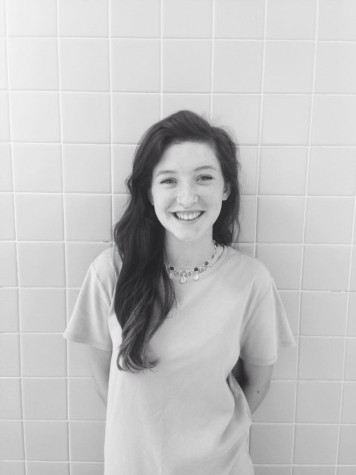Dawson’s Bleak; Teen Girl Discovers Negative Effects of ‘90’s Melodrama On Her Mental Health
April 3, 2015
Summer of 2014: I lie entirely immobile, maybe paralyzed but too lazy to check, in a bed of unwashed sheets littered with the crumbs of dozens of NutriGrain bars. Something rustles and squeaks beneath the piles of clothes and candy wrappers. What might be maggots scurry across a plate encrusted with the remnants of a Trader Joe’s frozen chicken & cheese tamale, and another plate of half-eaten nachos that litter my now Very Off-White and Arguably Brown carpet.
Tears stream down my unwashed face as I watch Katie Holmes, playing Joey Potter, wrap up season four of “Dawson’s Creek” with a graduation speech that tears my soul apart, where she calls her graduating class “a population of memories.” My teardrops become the words of a poem I don’t like to look at, something full of nostalgic cliches and cheap symbolism about goodbyes.
I remember each episode, each tragic death, each almost-sex scene, each high school dance, each crop top. I remember that time Dawson confessed to Joey that he “walked his dog” every morning while he watched Katie Couric on the Today Show and I projectile vomited on my keyboard!
I realize I’ve really fallen in love; not with Dawson, as you might think–his middle part and sneakers make me want to shave his head and leave him naked and weeping in his namesake creek–but with this show. I watch it in the morning sometimes, and late at night. It makes me happy. Every episode is new and intriguing and exciting.
I talk about it with my uninterested friends who call me “crazy” and tell me to “please stop talking about it.”
My uninterested friends are right, I know, so I make fun of myself for it, but I am not embarrassed enough to change the browser back to my unfinished Frontline documentaries on the Chernobyl disaster.
It is only by the fourth season that I’ve realized just how emotionally invested I truly am. It is by the fourth season that I realize this is maybe not love at all, but really only a sad someone finding solace in something that ended 10 years ago.
Why, though, is it so easy to become so emotionally invested in something so unrealistic? Perhaps because it is watching life, and maybe an ideal one, go by while you’re not moving at all, while you’re eating granola from a mason jar in your underwear. Problems will resolve themselves! Friendships will be mended! Kisses will be had! The Sarah Mclachlan and Blink 182 direct your emotions and you follow along blindly. It is a comfortable emotional involvement, you are detached and happily observing. This sort of relationship is the sort that’s free from consequences or complications.
All of life is almost directly the opposite of these things. You have to get up and wear pants and solve your own problems, talk through your relationships, fight your way through nervousness and awkward encounters, feel your heart beating uncomfortably fast, cope with the inexplicable emptiness you feel on lonely Friday nights, wipe away tears that fall as a result of listening to Bon Iver sing to you quietly about his broken love with a wood nymph. You have to deal with real emotions.
It is easy to sit on the couch and fall sort of in love with something as easily detachable as a TV show.
It is difficult, however, to get off the couch, to put on makeup and clothing so that you can spend time with someone who, you will find, is so inconvenient and emotional—among other things—to smile and laugh with them, to say smart things but never too many things, to apologize for your sweaty hands when you find yours in their pleasantly dry ones. It is much easier to do nothing than to do something. It is much easier to pretend to fall in love than to do it.
But when you only pretend to fall in love, you haven’t Really fallen in love with anything. You are sitting scared and lonely behind a TV screen and crying about what you’ve never made the effort to have.
It’s important to remember that television shows are not a warm body in the bed next to us. They are not a beautiful and interesting someone. They are not a conversation. They are not a reality, a tangible experience. They do not smile, or laugh, or listen in a way that makes us feel whole and worthwhile and truly happy. They are really nothing but a two-dimensional pity friend. They are the absence of your own usefulness and creativity.
Summer of 2015: I am spending my many spare moments outside, more than likely because my laptop has finally broken by then and not because I have made the active decision to be outside, but regardless, the grass is only a little itchy and the sun is shining a kind 74-degree warmth. I smell like dirt and sunshine and I lost my shoes a while ago. I am reading next to someone else who will read socially (The Dream) and my sweaty hands hold a Salinger I’ve read three times and will read many more. The sun and summer and someone, I find, are greater than the dark and depression and “Dawson’s Creek”.

